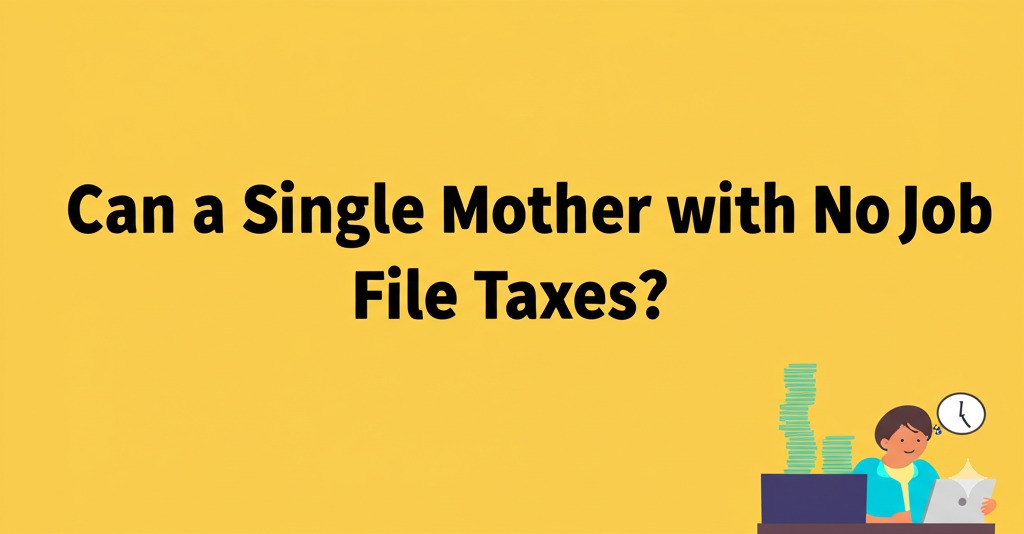
Being a single mother comes with many challenges—juggling childcare, managing finances, and navigating government support. One question that often arises is: Can a single mother with no job file taxes? The short answer is yes, and in many cases, doing so can unlock financial benefits like tax credits and refunds that can significantly help.
In this article, we’ll break down everything you need to know about tax filing for unemployed single moms, including eligibility, benefits, and the filing process.
Why Would a Single Mother Without a Job File Taxes?
Even without income from a traditional job, filing a tax return may still be beneficial and even necessary. Here’s why:
1. Access to Refundable Tax Credits
Refundable tax credits can provide you with money even if you didn’t earn income:
- Earned Income Tax Credit (EITC) – While this typically requires earned income, if you had part-time work or gig income earlier in the year, you might qualify.
- Child Tax Credit (CTC) – You could receive up to $2,000 per child, and the Additional Child Tax Credit (ACTC) is refundable.
- American Opportunity Tax Credit (AOTC) – If you or your child is in college, you could be eligible for up to $2,500, with $1,000 refundable.
2. Report Other Income Sources
Even without employment, you might have taxable or reportable income, such as:
- Unemployment benefits
- Child support (not taxable but relevant for financial aid)
- Government assistance (like SNAP or TANF, usually not taxable)
- Freelance or cash-based income
3. Future Eligibility for Benefits
Filing taxes each year helps establish a paper trail of financial history, which can be useful when applying for:
- Subsidized housing
- Medicaid or CHIP
- FAFSA for your children’s education
Who Qualifies to File Taxes with No Job?
You can file taxes regardless of employment status if:
- You’re a U.S. citizen or resident alien
- You have a Social Security number (SSN) or ITIN
- You meet income thresholds or want to claim refundable credits
When Filing Is Required
Even with no income, the IRS recommends filing if:
- You had any self-employment income
- You received Marketplace health insurance subsidies
- You’re claiming dependents or refundable tax credits
How to File Taxes as a Single Mother with No Job
Filing taxes without a job might seem confusing, but it’s manageable with the right tools.
Step-by-Step Filing Guide
- Gather Your Documents
- Social Security numbers for yourself and your children
- Records of any income (W-2s, 1099s, unemployment forms)
- Proof of government benefits (if any)
- Prior tax returns
- Choose a Filing Method
- Free IRS tools like IRS Free File
- Free programs like TurboTax Free Edition, H&R Block Free, or Credit Karma Tax
- Local nonprofit tax clinics (VITA) for in-person help
- Complete Your Return
- Use your dependents’ information to qualify for credits
- Report all income, even if it’s from side gigs or cash work
- Claim any refundable credits
- Submit and Track
- File electronically for faster processing
- Use direct deposit for your refund
Common Questions Single Mothers Ask About Filing Taxes
What If I Didn’t Work at All?
You can still file a return, especially if you qualify for child-related tax credits. Filing may result in a refund, even without paying taxes.
Is Child Support Taxable?
No, child support payments are not taxable and don’t need to be reported as income.
What About Stimulus Checks or Pandemic Credits?
If you missed stimulus checks or Child Tax Credit advance payments, filing now can help you claim those retroactively.
Can I Still File if I Missed the Deadline?
Yes, you can file late tax returns for up to three years to claim a refund. After that, the IRS may keep your money.
Tips for Filing Taxes When You’re a Single Mom Without a Job
- Use free filing resources to avoid unnecessary fees
- Keep track of any gig work or cash income
- Claim every credit you qualify for
- File even if it’s not required—it could bring money back to you
Final Thoughts: Yes, You Can—and Should—File Taxes
So, can a single mother with no job file taxes? Absolutely. Not only is it legal, but it’s often a smart financial move. Filing your taxes—even with no income—can unlock powerful tax credits, help you qualify for other benefits, and put money in your pocket.
Don’t leave money on the table. If you’re unsure where to start, consider using the IRS Free File program or visiting a local tax clinic for help.

Andre Cuevas provides career insights, job search strategies, and professional advice to help individuals navigate the job market and achieve their career goals.






